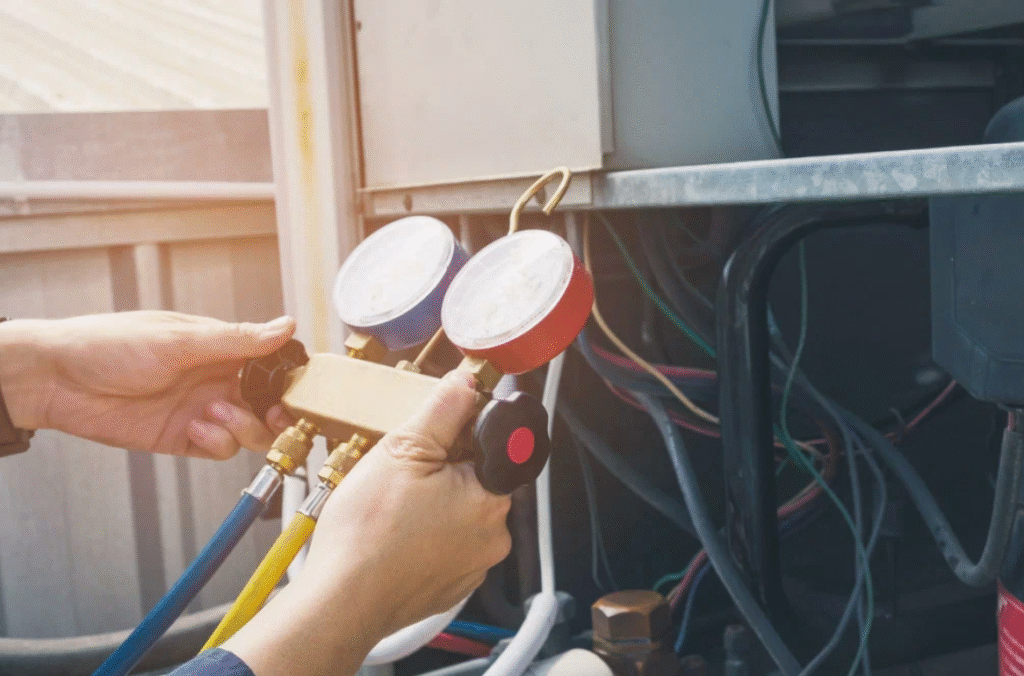When it comes to keeping your home comfortable year-round, few systems are as vital as your HVAC (Heating, Ventilation, and Air Conditioning) unit. However, many homeowners don’t realize just how important regular maintenance is—especially when it comes to HVAC filter replacement and air conditioning repair. Ignoring these aspects can lead to reduced efficiency, higher utility bills, and even complete system breakdowns. In this article, we’ll explore the importance of replacing your HVAC filter and what to know when your air conditioning system needs repair.
Why HVAC Filter Replacement Matters
One of the simplest but most crucial aspects of HVAC maintenance is replacing the air filter. The filter’s job is to trap dust, pollen, pet dander, and other airborne particles, preventing them from circulating throughout your home and clogging your HVAC system.
Benefits of Regular HVAC Filter Replacement:
- Improved Air Quality
A clean filter ensures that your indoor air is free of allergens and pollutants, which is especially important for individuals with allergies or respiratory conditions. - Energy Efficiency
A dirty filter forces your HVAC system to work harder to push air through, consuming more energy and driving up your electricity bill. - Extended System Life
Regular filter changes prevent dust and debris from building up inside your unit, reducing wear and tear on critical components. - Lower Repair Costs
A clean filter keeps your system running smoothly, decreasing the likelihood of emergency breakdowns and expensive repairs.
How Often Should You Replace Your HVAC Filter?
The general recommendation is every 1 to 3 months, depending on several factors:
- Type of filter (standard fiberglass vs. high-efficiency pleated filters)
- Pets in the home (more hair and dander)
- Home location (dusty or pollen-heavy environments)
- Occupants’ health needs (those with asthma may need cleaner air)
Some smart thermostats and HVAC systems now alert homeowners when it’s time to change the filter, making maintenance even easier.
Signs You Need Air Conditioning Repair
Even with regular maintenance, your air conditioning system may still encounter problems. It’s important to catch signs of trouble early before a minor issue turns into a major headache.
Common Signs Your AC Needs Repair:
- Warm Air
If your vents are blowing warm or room-temperature air, there may be a refrigerant issue or compressor failure. - Weak Airflow
Poor airflow could be a sign of a clogged filter, blocked ductwork, or failing blower motor. - Frequent Cycling
If your system turns on and off more frequently than normal, it could indicate an issue with the thermostat or electrical components. - Strange Noises
Grinding, squealing, or banging noises suggest mechanical problems that need immediate attention. - Unusual Smells
A musty odor might indicate mold inside the unit or ductwork, while a burning smell could signal an electrical issue. - Water Leaks
Condensation is normal, but pooled water or refrigerant leaks around your unit are not. These can lead to water damage and require professional repair.
Common Air Conditioning Repairs
While every situation is different, here are some of the most common AC repair issues technicians handle:
- Refrigerant Leaks
Low refrigerant levels reduce cooling efficiency. A technician will find and fix the leak before recharging the system.
- Compressor Failure
The compressor is the heart of the AC unit. If it fails, your system won’t cool properly. Replacing it can be costly, so early detection is crucial.
- Capacitor or Contactor Replacement
These electrical components help start the motor and keep it running. If they fail, your unit may not turn on or may run inefficiently.
- Thermostat Malfunction
Sometimes the issue isn’t with the AC at all, but with the thermostat. A faulty thermostat can send incorrect signals, causing erratic performance.
- Dirty or Frozen Evaporator Coils
Evaporator coils need to be clean for efficient operation. If they freeze over, the unit won’t cool effectively and could shut down entirely.
Preventive Maintenance Tips
Avoid costly repairs and ensure optimal performance with these HVAC best practices:
- Change your filter regularly.
This cannot be overstated. A fresh filter improves air quality and system efficiency. - Schedule professional HVAC inspections at least once a year.
A tune-up can catch small issues before they become major problems. - Keep outdoor units clean.
Remove leaves, dirt, and other debris from around your outdoor condenser unit. - Seal leaks in your ducts.
Leaky ductwork can reduce airflow and cause your system to overwork. - Use a smart thermostat.
Programmable thermostats can optimize your energy use and extend the life of your HVAC system.
When to Call a Professional
While some homeowners are comfortable with basic tasks like replacing filters or cleaning debris, most AC issues require the expertise of a licensed HVAC technician. If you notice signs like warm air, odd sounds, or high energy bills, don’t delay in calling a professional. A prompt air conditioning repair can save you money and keep your home comfortable.
Choosing the Right HVAC Contractor
Not all contractors are created equal. Here are a few tips for finding a reliable HVAC professional:
- Check certifications and licenses.
- Read customer reviews and testimonials.
- Get estimates in writing.
- Ask about warranties and service guarantees.
- Look for ENERGY STAR partners or NATE-certified technicians.
Final Thoughts
HVAC filter replacement and air conditioning repair are two key components of keeping your home comfortable, energy-efficient, and safe. By understanding how your system works, recognizing the early signs of trouble, and investing in regular maintenance, you can avoid costly repairs and extend the life of your HVAC unit.
Don’t wait for a sweltering summer day to realize your system isn’t working properly. Change your filters on time, stay alert for warning signs, and work with trusted HVAC professionals to keep your air conditioning in peak condition all year long.







